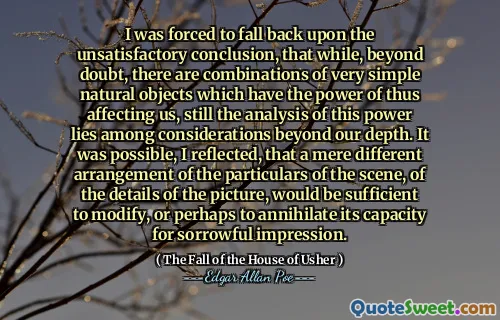"The Fall of the House of Usher" is a short story by Edgar Allan Poe that explores themes of madness, isolation, and the impact of family legacy. The narrative follows an unnamed narrator who visits the house of his childhood friend, Roderick Usher. The Usher family is plagued by a mysterious illness that affects both Roderick and his twin sister, Madeline, who has recently died, or so it appears. The atmosphere is one of gloom and dread, setting the tone for the events that unfold.
As the narrator stays in the decaying mansion, he observes Roderick's mental decline and the eerie connection between the twins. The house itself seems to embody the family's tragic history, with its dark and antiquated structure reflecting the psychological turmoil of its inhabitants. The narrator experiences a growing sense of unease, witnessing strange occurrences that suggest a deeper horror at play.
The story culminates in a tense and surreal climax, revealing the fates of Roderick and Madeline. The collapse of the house at the end symbolizes the end of the Usher lineage, encapsulating the themes of decay and demise integrated throughout the narrative. Poe masterfully intertwines the physical and psychological horror, providing a haunting reflection on the effects of familial ties and the inevitability of death.
More »
Today Birthdays
1919 -
J. D. Salinger
1974 -
Ally Carter
1879 -
E. M. Forster
1968 -
Mark Lawrence
1839 -
Ouida
1958 -
Hamza Yusuf
1924 -
Charlie Munger
1897 -
Catherine Drinker Bowen
1940 -
Leonard Susskind
1767 -
Maria Edgeworth
1915 -
John Henrik Clarke
1864 -
Alfred Stieglitz
1863 -
Pierre de Coubertin
1716 -
William Wycherley
1874 -
Frank Knox
1956 -
Christine Lagarde
1972 -
Asghar Farhadi
1934 -
Lakhdar Brahimi
1953 -
Gary Johnson
1973 -
Saffron Burrows
1968 -
Cat Cora
1966 -
Ivica Dacic
1975 -
Ayman Odeh
1745 -
Anthony Wayne
1940 -
Frank Langella
1947 -
Jon Corzine
1895 -
J. Edgar Hoover
1922 -
Fritz Hollings
1826 -
Robert Rainy
1963 -
Laura Ingraham
